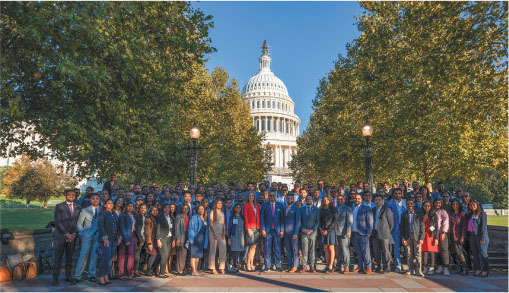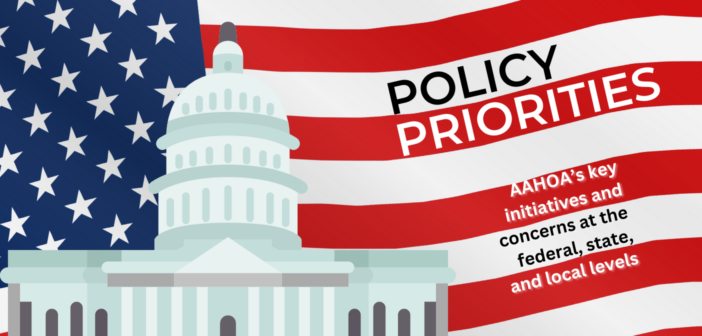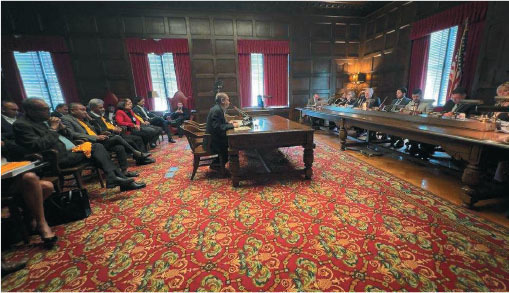AAHOA’s key initiatives and concerns at the federal, state, and local levels
PART I: STATE AND LOCAL ISSUES
States and local governments pass 40,000 or more new laws every year. These laws can drastically impact AAHOA Member businesses, which is why AAHOA’s dedicated state and local Government Affairs Team works around the clock to promote and protect the business interests of America’s hoteliers.
Five high-priority issues:
1. Addressing the Homelessness Crisis
AAHOA opposes compulsory Housing Vouchers or Programs directed toward hotels as mechanisms purporting to resolve the homelessness crisis.
The utilization of hotels as a mandatory solution for sheltering unhoused individuals is inadequate, insufficient, and could potentially lead to unstable conditions for the individuals and other guests. Hotel housing programs fail to substantively address the underlying causes of homelessness, including the lack of affordable housing, mental health support, and rehab services. AAHOA strives to continue working with state and local partners to find solutions for the ongoing housing crisis.
2. Promote Short-Term Rental (STR) Regulation
AAHOA supports STR parity, data transparency, and a level playing field.
STRs are largely unregulated accommodations that frequently are not held to the same standards and regulations imposed on hotels. This creates unfair and unfavorable challenges for hotels seeking to serve the traveling public and potentially unsafe conditions for guests. AAHOA urges policymakers to implement and enforce uniform and standard regulations that ensure STR parity, data transparency, and a level playing field. Such regulations will ensure the safety, quality, and accountability of lodging options for the traveling public, regardless of whether they are staying in a hotel or an Airbnb/Vbro rental home.
3. Support Lodging Tax Dollars Only for Tourism
AAHOA supports the reinvestment of tourism dollars – which have been re-allocated for non-tourism projects – back into tourism.
Many states and municipalities seek to raise lodging taxes and then use these tax dollars to fund non-tourism-related state and/or local projects. AAHOA supports the use of these lodging taxes only for tourism to bring more travelers to the local communities and benefit all related businesses, including hotels, tourist attractions, restaurants, gas stations, and other retail businesses. Tax dollars for tourism means a winning boost for all.
4. Clarifying And Maintaining Innkeeper/Guest Relationships
AAHOA aims to support and further define the Innkeeper/Guest Relationship by (1) clarifying “guest” vs. “tenant” in state and local laws and (2) adding hotel guests who overstay their reservations without paying to Trespasser definitions.
Some states do not clearly define when hotel guests become tenants. This legal ambiguity places burdens on both hoteliers and guests. When guests overstay without paying, hoteliers need clear laws that support a prompt and lawful removal.
5. Combatting Human Trafficking
AAHOA supports legislation that addresses human trafficking in communities across the U.S. and seeks inclusion in all important human trafficking conversations and task forces. AAHOA has long been at the forefront of human trafficking education and prevention. Hotel owners and their employees are in a position to make a real difference in stopping human trafficking – but only if they know what signs to look for and how to best respond. AAHOA remains committed to empowering hotel owners and hospitality professionals to help keep trafficking out of their hotels and their communities.
 PART II: FEDERAL ISSUES
PART II: FEDERAL ISSUES
In addition to great efforts made toward state and local advocacy, AAHOA Members and leadership are making a concerted and very public push for sound public policy at the federal level. While state and local advocacy is vital, it’s important federal advocacy is part of the overall approach.
Three high-priority issues
1. Promote Access to Capital by Increasing SBA Loan Caps/Limits
Call to Action: Increase SBA 7(a) and 504 Loan Limits from $5 Million to $10 Million
Obtaining access to capital is critical for small businesses to operate and thrive in a challenging economy. Currently, Small Business Administration (SBA) 7(a) and 504 loans are capped at $5 million, which was last set in2010. For hoteliers, over the past decade, the costs of constructing and purchasing properties have skyrocketed.
Many hoteliers make use of SBA 7(a) and 504 loans to help finance the new construction or purchase of their hotel properties. Since the value of the hotels is significantly higher than current loan limits, there remains substantial collateral for higher loan amounts.
Congress can greatly assist small businesses by increasing the SBA loan limits to match the current economic conditions and thereby create a sustainable business model for the future.
2. Credit Card Competition Act – S. 1838/H.R. 3881
Call to Action: Support the Credit Card Competition Act (S. 1838/H.R. 3881)
Credit and debit card swipe fees have more than doubled during the past decade and soared $22 billion last year to a record $160.7 billion. As these fees continue to rise, AAHOA Members know exactly how much they affect our bottom line. The bipartisan Credit Card Competition Act (S. 1838/H.R. 3881) was introduced to bring competition to the credit card network routing market. Under the legislation, a credit card would be required to have more than one network option on which to route financial data. That would make networks compete over fees, security, and service and is expected to save merchants, like AAHOA Members and their customers, $15 billion a year.
To advocate for our members, AAHOA recently joined the Merchants Payments Coalition (MPC). The MPC is a group of retailers, supermarkets, restaurants, drug stores, convenience stores, gas stations, online merchants, and other businesses focused on reforming the U.S. payments system to make it more transparent and competitive.
The MPC firmly believes in opening the payments market and introducing competition, which would lower costs and drive innovation.
Visa and Mastercard – which control more than 80% of the market –currently price-fix swipe fees charged by banks that issue cards under their brands and also block transactions from being processed over other networks that could do the job with lower fees and better security.
3. Addressing the Labor Shortage
Call to Action: Support the Essential Workers for Economic Advancement Act (H.R. 3734) and the SEASONAL Act (S. 2705)
Essential Workers for Economic Advancement Act, H.R. 3734 – The U.S. economy is facing severe labor shortages that are straining our economic recovery. The latest U.S. Bureau of Labor Statistics data show we have 10 million job openings but only 5.7 million unemployed workers. Employers weathering supply constraints and record inflation are forced to operate their businesses at reduced capacity due to a lack of labor.
To address these shortages, the Essential Workers for Economic Advancement Act will create a market-driven immigration visa program targeted to workers in occupations that do not require a college degree to do year-round, non-farm work. The bill creates a two-track system in which employers and potential immigrant laborers are both required to receive a permit to work in the U.S. The bill will require an employer to apply to the federal government for approval to hire an H-2C worker and does not allow a worker to enter the U.S. until they have been affirmatively hired by an employer that has received approval from the government to hire for that position. These employees are only ever allowed to work for an approved employer, at the approved location, in the specific job that was approved.
The SEASONAL Act, S. 2705 – The State Executive Authority for Seasonal Occupations Needing Additional Labor (SEASONAL) Act is bipartisan legislation that would enable governors to petition the federal government for supplemental H-2B visas beyond the national cap of 66,000.
If enacted, governors of states at or below 3.5% unemployment would have the authority to request visas for as broadly as for the entire state for as narrow as specific labor categories or for specific economic regions, enabling state-level attention to their specific economic needs. Governors would have to certify that there is a persistent, unmet need for labor in their states and that supplemental H-2B visas will not displace domestic workers or negatively affect average wages in the state. Nothing in the bill would prohibit a state legislature from imposing limits on a governor’s requests. Federal inaction shouldn’t hold back states from serving the needs of their economies. Further, easing labor shortages would increase productivity and mitigate supply constraints that are contributing to inflation. Focusing on legal, nonimmigrant pathways to work in the country may also curb economic pressures that drive many working-age individuals to seek illegal entry to the country.





